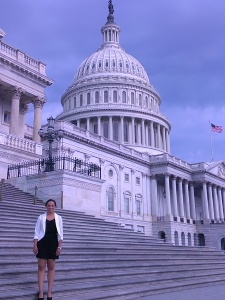
Rachel Abeh
Be sure to hear more from Rachel today in the Tax, Finance and Ag Policy Committee meeting.
By Rachel Abeh, MSU Collegiate Stockgrower, NCBA and PLC intern
In conclusion of my internship with the National Cattlemen’s Beef Association (NCBA) and the Public Lands Council (PLC) I had the opportunity to head back west to present the NCBA policy report to Montana Stockgrowers members.
While working with NCBA and PLC I had a first-hand opportunity to see the legislative process at work. The internship was a great experience and gave me a chance to engage in beef policy at the national level. Additionally, my time at NCBA further solidified my interests in pursuing a career in the policy arena.
I worked closely with PLC, dealing with western issues—some of the most important to Montana’s producers. While at first I was a little skeptical about going to Washington, seeing the impacts of the work NCBA and PLC do for folks at home made it worthwhile.
It was exciting for me because NCBA really champions the beef industry in D.C. There is no doubt other groups engage; however, the caliber of professionals NCBA has on staff are bar-none. I was able to work with and learn from a great group of industry leaders and I really saw the Cattlemen excel—even other animal ag groups on the Hill, which made me proud to be an NCBA member and their intern.
NCBA policy is membership-driven and it was exciting for me to know I was engaging on issues that matter to farmers and ranchers across the country. NCBA’s top priority remains the Farm Bill; unfortunately, during my time in D.C. the bill didn’t pass. However, NCBA continues to advocate for passage, which will hopefully happen this January—ensuring stability for producers. Programs such as: Disaster Assistance, a Research title, and Conservation title.
Additionally, NCBA keeps vigilant over other issues impacting our industry such as tax and trade. A victory this past year was the estate tax exemption level at $5 million per individual and $10 per couple. NCBA worked closely with Baucus to champion this effort and continues to support full repeal of the “Death Tax.”
While I was in Washington, a feat for the industry took place as the Grazing Improvement Act passed the Senate. This is something important to western producer so it was exciting to attend the hearing and the meetings that came before passage.
NCBA also works closely with Montana’s delegation; in fact, NCBA continues to support Steve Daines as he works for Montana’s industry. I never realized how Montana’s issues were represented in D.C. but there is no doubt that NCBA and PLC are working for producers in this state.
 The Montana Stockgrowers Association’s Foundation is proud to support our state’s bright and talented youth as they explore opportunities across the country. This fall, we sponsored Rachel Abeh of Livingston, Montana to intern with the National Cattlemen’s Beef Association in Washington D.C. During her time there, she worked with the NCBA and Public Lands Council team as they worked on behalf of not only Montana ranchers, but the nation’s beef producers.
The Montana Stockgrowers Association’s Foundation is proud to support our state’s bright and talented youth as they explore opportunities across the country. This fall, we sponsored Rachel Abeh of Livingston, Montana to intern with the National Cattlemen’s Beef Association in Washington D.C. During her time there, she worked with the NCBA and Public Lands Council team as they worked on behalf of not only Montana ranchers, but the nation’s beef producers.







